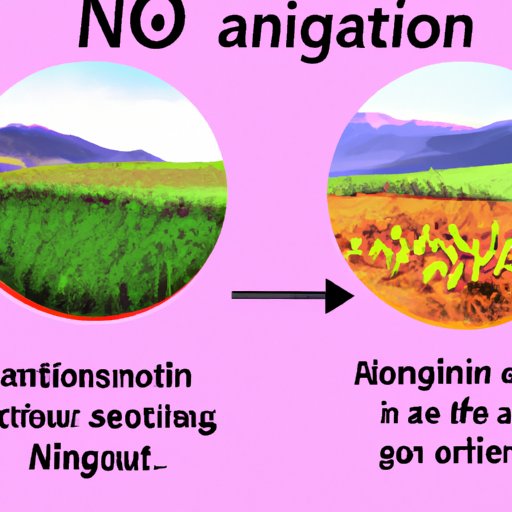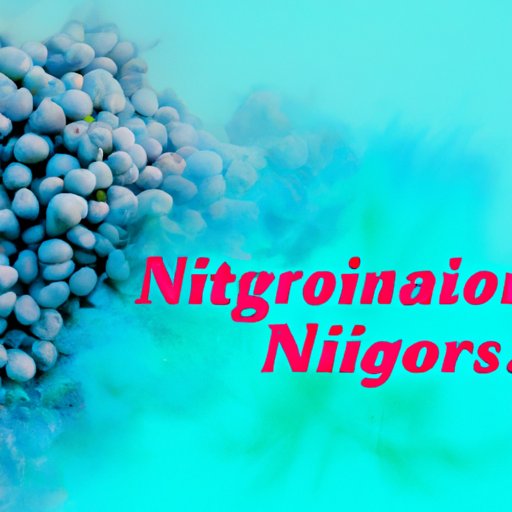Introduction
Nitrogen is a colorless, odorless gas that makes up approximately 78% of the Earth’s atmosphere. While it is largely inert and non-reactive in its gaseous form, nitrogen is a crucial component in various industrial, agricultural, and medical applications. In this article, we will explore the diverse uses of nitrogen and its importance in modern society.
A Comprehensive Guide to Nitrogen and Its Applications
Nitrogen can be produced through a number of methods, including the fractional distillation of liquid air, the purification of natural gas, and the production of ammonia through the Haber-Bosch process. Nitrogen has a number of unique physical and chemical properties that make it useful in a wide range of applications. For example, its non-reactive nature makes it an ideal blanketing gas in industrial processes that require an oxygen-free environment.
A variety of industries make use of nitrogen in their processes, including electronics manufacturing, chemical production, and oil and gas extraction. The use of nitrogen can help to improve product quality, increase process efficiency, and enhance safety in industrial environments. For example, nitrogen can be used to prevent explosions and fires in equipment that processes flammable materials.
Understanding the Role of Nitrogen in Plant Growth and Agriculture
Nitrogen is an essential nutrient for plant growth, and it is often a limiting factor in agricultural production. Nitrogen can be added to soil through the use of fertilizers, which can help to enhance plant growth and increase crop yields. Nitrogen fertilizers can be divided into three main categories: organic, inorganic, and slow-release. Each type of fertilizer has its own unique benefits and drawbacks.
While nitrogen is vital for plant growth, excessive nitrogen use can have negative impacts on the environment. When excess nitrogen is added to soil, it can leach into groundwater and cause pollution. Additionally, nitrogen-based fertilizers can contribute to the production of greenhouse gases, which can have long-term impacts on the environment.
Nitrogen as a Critical Component in the Production of Explosives and Fertilizers
Nitrogen is a key component in the production of a variety of materials, including explosives and fertilizers. Ammonium nitrate is a common fertilizer that is produced through the reaction of ammonia gas and nitric acid. Nitrogen is also a critical component in the production of explosives like dynamite and TNT. The unique properties of nitrogen make it ideal for use in these applications, as it can help to provide stability and increase energy output.
The Role of Nitrogen in the Preservation of Food and Beverages
Nitrogen is commonly used in the preservation of food and beverages, particularly those that are high in fat or oil content. When used in food packaging, nitrogen can help to prevent spoilage and extend the shelf life of products. Additionally, the use of nitrogen can help to maintain the flavor and texture of foods by preventing the oxidation of fats and oils. However, there are also potential drawbacks to the use of nitrogen in food preservation, such as the risk of botulism when used in low acid foods.
An Exploration of the Use of Nitrogen in Medical Procedures and Treatments
Liquid nitrogen is a widely used agent in medical procedures and treatments. Its low temperature makes it useful for cryosurgery, which involves freezing and destroying abnormal tissue. Additionally, liquid nitrogen can be used to store biological samples at extremely low temperatures, which can help to preserve them for future use.
However, the use of nitrogen in medical applications can also have risks. When used improperly, liquid nitrogen can cause tissue damage or even lead to frostbite. Additionally, the use of nitrogen in cryosurgery can result in scarring or other complications.

Nitrogen and Its Impact on the Environment
The use of nitrogen in various industrial and agricultural applications can have negative impacts on the environment. Excessive nitrogen use can contribute to the production of greenhouse gases like nitrous oxide, which can have long-term effects on the climate. Additionally, nitrogen pollution can lead to the eutrophication of waterways and other ecological problems.
Efforts are being made to reduce nitrogen pollution through better agricultural practices, such as the use of cover crops and precision application of fertilizers. Additionally, technological advancements in nitrogen removal systems are helping to reduce nitrogen pollution from wastewater treatment plants.
Innovations in Nitrogen Technology and Their Potential Uses for the Future
As the demand for nitrogen continues to grow, there is a need for continued research and development in nitrogen technology. One area of focus is the development of more sustainable nitrogen production methods, such as the use of renewable energy sources like solar power. Additionally, there is potential for the use of nitrogen in more advanced technologies, such as fuel cells and energy storage systems.
Conclusion
Nitrogen is a versatile and valuable component in a number of industries, ranging from agriculture to medicine to technology. While its use can have negative impacts on the environment, there are also many potential benefits to its application. Moving forward, continued research and development in nitrogen technology will be critical to ensuring its sustainable use in the future.
